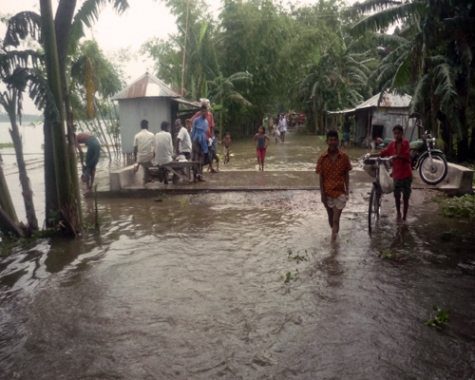Climate change and carbon-dioxide emissions are reducing the world’s gross domestic product by 1.6 per cent a year, about $1.2 trillion, and inflicting “unprecedented harm” on humanity, according to a new report.
The report – “Climate Vulnerability Monitor: a guide to the cold calculus of a hot planet,” commissioned by 20 governments in the Climate Vulnerable Forum, and compiled by humanitarian organisation DARA – calculates the human and economic impact of climate change in 184 countries between 2010 and 2030.
It says that global warming will not only lead to environmental catastrophe but is already choking the international economy.
“Failure to act on climate change already costs the world economy 1.6 percent of global GDP amounting to $1.2 trillion in forgone prosperity a year,” said the report, released at the Asia Society in New York on Wednesday. Without fast action, it says, accelerating climate change impacts will cause more than 100 million deaths and knock off more than 3 per cent of GDP by 2030.
The report estimates that nearly 700,000 climate-related deaths already occur today, with almost 80 per cent occurring among children in South Asia and Sub-Saharan Africa, while the “carbon economy” is estimated to claim an additional 4.5 million-plus lives, primarily due to the impacts of pollution.
The combined number of deaths could rise to nearly 6 million annually by 2030 if action is
not taken, says the report, with more than 98 per cent of those deaths likely to occur in developing countries.
The climate forum’s chairman, Bangladeshi Prime Minister Sheikh Hasina, said weather pattern changes would be especially devastating for her country. “One degree Celsius rise in temperature is associated with 10 percent productivity loss in farming,” she said. “For us, it means losing about four million metric tonnes of food grain, amounting to about $2.5 billion. That is about two percent of our GDP.”
And while poorer countries are set to face the steepest economic damage in terms of GDP losses, the report warns that big countries will not be spared. “In less than 20 years China will incur the greatest share of all losses at over $1.2 trillion. The US economy will be held back by more two percent of GDP; India, over five percent of its GDP,” it says.
The report says that these projected losses “dwarf the modest costs” of addressing climate change and moving to a low-carbon economy – estimated at 0.5 per cent of GDP over the next 1o years – and concludes that “the worst impacts of climate change… can still be avoided if strong action is taken in the very near future to reduce greenhouse gas emissions that lead to the earth’s warming.”
“Reducing short-lived climate pollutants provides the fast mitigation that the world needs to save
millions of lives and avoid the worst of the predicted climate impacts,” said Durwood Zaelke,
President of the Institute for Governance and Sustainable Development. The short-lived climate
pollutants include black carbon, tropospheric ozone, methane, and hydrofluorocarbons.
“Reducing these pollutants, can cut the rate of warming in half over the next 40 years and in the
vulnerable Arctic by two thirds, saving millions of lives each year,” Zaelke said. “Existing technologies can be used, and in many cases existing laws and institutions.”
“The first priority should be phasing down HFCs through the Montreal Protocol – the single biggest,
fastest, and cheapest mitigation available to the world in the next ten years,” Zaelke added.








